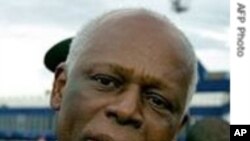<!-- IMAGE -->
Angola, a long and bitter civil war now behind it, is on a track to join
Nigeria, South Africa and Ghana as one of the economic power houses of Africa.
Its strong energy sector and agricultural potential have it poised for further
growth, but that may not be realized without good governance and strong
democratic institutions.
In her recent visit to the capital Luanda aiming to bolster ties between our
two nations, U.S. Secretary of State Hillary Clinton said that the government
of President Jose Eduardo dos Santos has taken some steps to improve
transparency, but more can be done to win the trust of its citizens and the
international community. Angola rivals Nigeria as Africa's biggest oil
producer, but few of its people see the economic benefits.
"Corruption is a problem everywhere and where it exists, it undermines
people's faith in democracy, it distorts governance," Secretary Clinton
said. Her remarks echoed a theme voiced by President Barack Obama that nations
in Africa must control their own destinies by adopting democratic values and
institutions and strong, open legal systems.
To this end, she encouraged the Luanda government to proceed with now-uncertain
presidential elections in a free and fair manner. In the meantime, the U.S.
will expand technical assistance to Angola and support for agriculture, health,
education, renewable energy and other programs aimed at strengthening local
government and preparing the media for elections.
"We look forward to Angola building on its positive steps, including the
adoption of a new constitution, investigating and prosecuting past human-rights
abuses and holding a timely, free and fair presidential election," the
Secretary said.
Angola gained independence from Portugal in 1975, but hasn't had a presidential
election since 1992.




